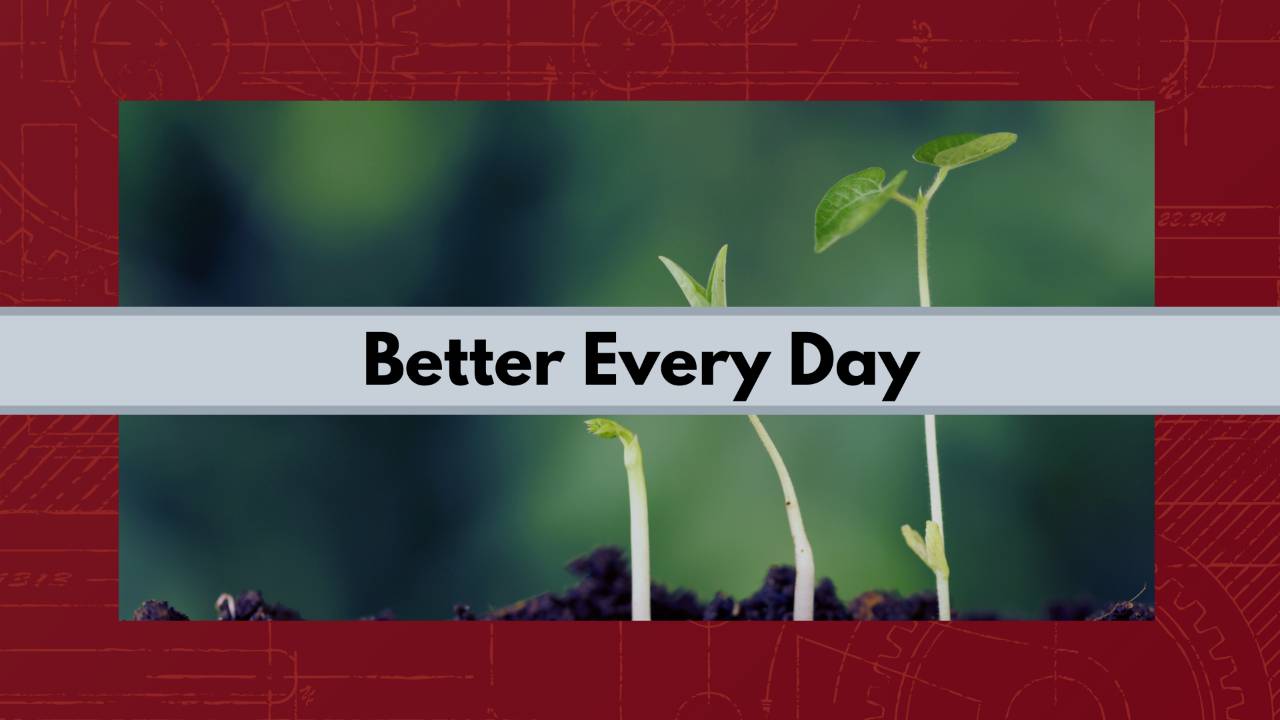Better Every Day
Your 52-Week Journey for Peak Performance
Whether you're an entrepreneur, an artist, a student, or someone just passionate about lifelong learning and self-improvement, "Better Every Day" is curated to fuel your fire. If you believe in the power of consistency and value the gratification that comes from personal growth, this journey is for you.
|
I’d like to start this week with a short parable that I have found to be very impactful and very true.
"There was a traveler who was walking from one village to another. During his journey, he saw a monk working in the field and he stopped and said – I’m on my way to the village in the valley, can you tell me what it’s like? The monk asked where he had come from. From the village in the mountains- the man said. What was it like? asked the monk. Awful- the man explained. I found the people to be rude and uninviting, nobody spoke my language, so it was hard to communicate. I couldn’t stay in anyone’s house, so I had to sleep in a barn. And the food, it was even worse. I think that you will find the village in the valley is much the same- said the monk.
A few hours later, another traveler passed the same monk headed in the same direction. I’m on my way to the village in the valley, said the man. Can you tell me what it’s like? Where are you coming from?- asked the monk. From the village in the mountains, said the traveler. And what was it like?- asked the monk. It was incredible, the man replied. No one spoke my language, so we had to communicate in different ways, mostly using our hands and facial expressions. I slept in a barn on the turf, which was amazing. I’ve never done that before. They fed me stew that was completely new to me. I have no idea what was in it, but just to experience the spices and foods from the locals was amazing. It was one of the best experiences of my life. Well, the monk responded- I think that you’ll find the village that you’re headed for, the village in the valley, is much the same."
The lens that we bring to any given moment will filter how we experience that moment or the meaning that we give to it. This parable vividly illustrates the profound impact our mindset can have on our lives and achievements.
This is also not just a matter of anecdotal evidence; a wealth of scientific research supports the notion that an optimistic mindset can lead to higher levels of performance. For instance, a study by Seligman and Schulman (1986) found that optimistic salespeople outperformed their pessimistic counterparts by 20-40%. This is attributed to optimists viewing setbacks as temporary and external, which fuels persistence and resilience. Similarly, Carver and Scheier (2014) demonstrated that optimists are more likely to engage in goal-directed behavior and exhibit better stress management, directly correlating to enhanced performance in various areas of life. The power of optimism cannot be overstated. It shapes our perception of possibilities, energizes our pursuit of goals, and can even influence physical health. A Harvard School of Public Health study, for example, found that optimistic individuals had a significantly reduced risk of heart disease (Kubzansky & Thurston, 2007).
As we absorb the lessons from the opening parable, it becomes clear that adopting an optimistic mindset is not just a feel-good choice, but a strategic one. By choosing optimism, we open the door to not only greater achievements but also to a more fulfilling and resilient life. When confronted with challenges, adopting an optimistic mindset can significantly transform obstacles into opportunities for success. This transformation occurs as optimism encourages a reevaluation of difficult situations, viewing them not as insurmountable barriers but as chances to learn, grow, and innovate. An optimistic approach fosters creative problem-solving, prompting individuals to look beyond the immediate hurdle and identify potential benefits or lessons embedded within the challenge. Instead of being paralyzed by fear of failure, an optimistic person is more likely to embrace risk and explore new strategies, turning what initially appears as a setback into a catalyst for personal and professional development. This mindset shift not only enhances resilience but also opens up avenues for progress that might have remained unseen under a pessimistic perspective.
Below, you will find 3 exercises you can use to first assess your level of optimism and take specific steps to increase this aspect of your mindset.
References:
Carver, C. S., & Scheier, M. F. (2014). Dispositional optimism. Trends in Cognitive Sciences, 18(6), 293-299.
Kubzansky, L. D., & Thurston, R. C. (2007). Emotional vitality and incident coronary heart disease: Benefits of healthy psychological functioning. Archives of General Psychiatry, 64(12), 1393-1401.
Seligman, M. E. P., & Schulman, P. (1986). Explanatory style as a predictor of productivity and quitting among life insurance sales agents. Journal of Personality and Social Psychology, 50(4), 832-838.
Key Actions:

Take the "Revised Life Orientation Test (LOT-R)"
Going back to the principle that self-awareness is the first step for any improvement, I would encourage you to take this short assessment to gauge your level of dispositional optimism.
Click [Here] to take this assessment.

Surround Yourself with Optimism
The environment and people around you can greatly influence your mindset. Strive to surround yourself with positive influences – people who are optimistic, uplifting, and supportive.

Challenge Negative Thoughts
Whenever you catch yourself having a pessimistic thought, pause and analyze it. Ask yourself if there's a more positive or realistic way to view the situation. By becoming aware of and consistently practicing cognitive restructuring, you can gradually train your brain to lean towards more optimistic thinking.
Coaching
Individual and Group Coaching
Looking for an individualized approach or a higher level of accountability to increase your chances of a successful outcome? Schedule a call and learn more about our coaching programs with doctoral-level coaches who have specialized knowledge in neuroscience, the psychology of performance, and decades of experience.
Schedule Free Call
Not a member of the 'Better Every Day' program?
Join our FREE 52-week program where we will send you exclusive content and training delivered to your inbox each week.
Get Started Now!!



